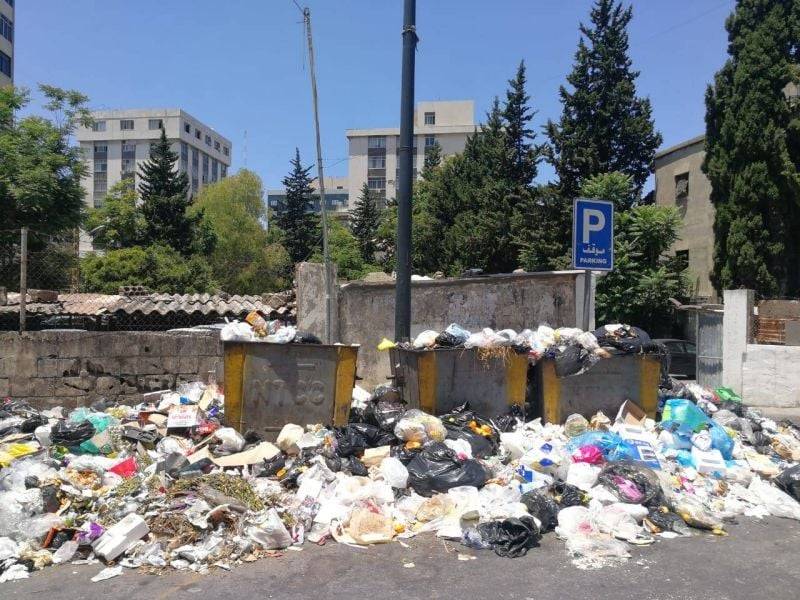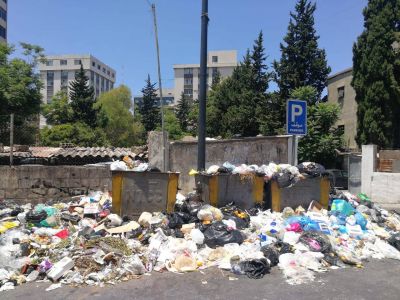
A pile of rubbish in a Saida street. (Credit: Mountasser Abdallah)
After drowning in household waste for several weeks, the city of Saida in the south of the country can start breathing again, as the waste collection resumed this week, Mayor Mohammed al-Saoudi told L’Orient-Le Jour.
The New Trading and Contracting SAL (NTCC), the company in charge of water collection in the city, resumed its work on Monday after its contract was extended by Najib Mikati’s caretaker cabinet and after the authorities made a first payment of LL3.5 billion on Tuesday, according to Saoudi.
The Lebanese state owes NTCC LL30 billion in dues since the economic crisis began in 2019 — payment arrears that have contributed to disrupting the company’s work on several occasions.
“Garbage collection resumed this week in Saida,” Saoudi said.
“NTCC’s contract expired at the end of December, but it was extended for six months by the cabinet. The company received yesterday [Tuesday] LL3.5 billion of the LL30 billion that the state owes it,” he told L’Orient-Le Jour.
NTCC had interrupted its work in Saida almost a month ago due to a lack of cash to pay for fuel for garbage trucks and an accumulation of dues by the cabinet, said one of its employees who asked our correspondent in the area, Mountasser Abdallah, for anonymity.
Meanwhile, in a statement issued a week ago, NTCC said, “The company did not receive a penny from the federation of municipalities of Saida-Zahrani since Feb. 20, 2019. Not to mention that these amounts have lost their value with the devaluation of the Lebanese lira.”
For Saoudi, “the situation is still delicate, despite the extension of the company’s contract.”
“It will be necessary to ensure that it will be paid in time to continue its activities, otherwise we risk falling back into the same problem,” he said.
“But the [caretaker] prime minister has promised to intervene,” added Saoudi. He also revealed that the municipality of Saida launched a tender a month ago in a bid to sign a contract with a new waste collection company.
Individuals who pay for fuel
In order to cope with the accumulation of waste that sometimes overflows on the road or sidewalks, many citizen initiatives financed in recent weeks the purchase of fuel for NTCC’s garbage trucks, allowing it to transport large quantities of waste to public dumps, our correspondent reported.
With the cessation of collection, it was especially the poorest and most overcrowded neighborhoods of Saida that suffered from the crisis, such as Taamir, Ain al-Hilweh or Mieh Mieh.
“The solution must come from the authorities and not from the citizens. The fact that we have come to finance the collection of garbage ourselves shows how incapable and corrupt the officials are,” Walid Assi, a resident of Saida, told our newspaper.
Last week, it was Hezbollah that responded to calls for help from the city’s residents by offering fuel oil to NTCC truck drivers, which helped clear some neighborhoods. Piles of garbage are a recurring problem in Lebanon, and have been since before the economic crisis, amid a lack of a sustainable waste management plan.
In 2015, the country was plunged into an unprecedented crisis for several months, when the contract of waste company Sukleen, which had been responsible for the collection and treatment of waste in Beirut and Mount Lebanon since 1997, expired and the country’s main landfill, Naameh, closed.
A new emergency plan focusing on the creation of two new landfills was adopted in 2016. Since then, the coastal landfills of Burj Hammoud-Jdeideh and Costa Brava have become saturated and have been expanded more than once by the authorities, while no sustainable solution has been found yet.
Moreover, the waste problem is currently exacerbated by the economic collapse, as the government struggles to pay for basic services such as garbage collection.
No crisis in Beirut
Despite the crisis and the national currency’s depreciation, Lebanon’s capital seems to have avoided a new waste crisis for the moment, although collection interruptions have been noted at regular intervals in recent years.
“The collection is currently carried out in a normal way in Beirut starting at 6 a.m.,” Walid Bou Saad, the director of Ramco, the company in charge of garbage collection in Beirut and the northern suburbs, told our newspaper.
“If there is an accumulation of garbage in some neighborhoods at the end of the day, it is because we stop working at 4 p.m. The landfill in Jdeideh [to which the capital’s waste is sent] closes at 5 p.m.,” he added.
This article was originally published in French in L'Orient-Le Jour. Translation by Joelle El Khoury.
